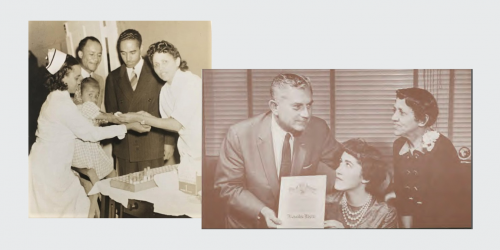
LEFT: Dr. Temple, pictured right, administers vaccine. Looking on is Dr. Owen A. Troy (left), president of the Community Health Association. [Photo courtesy of Dr. Carmelita Troy. ]
As the first Black graduate from the College of Medical Evangelists (now Loma Linda University) and the first Black female physician to receive a license from the state of California to practice medicine, she became a lifelong crusader for total community health. (1) Her outstanding work for the health of the total community was recognized by five United States presidents (from John F. Kennedy to Jimmy Carter) and numerous mayors of Los Angeles and other cities. Her upbringing and encounters with other people were likely foundational for her life’s journey.
Both her parents were well educated. Her father had graduated from Denison University in Ohio and the University of Chicago, and her mother had a teacher’s degree from Shaw University in South Carolina. When they moved to the state of Mississippi, her father was intentional to “get a house by the side of the road where the people pass by . . . all kinds of people, of all races, all creeds, all colors, all educational backgrounds” so that their “children will learn love before they learn hate.” When growing up, Ruth saw this attitude exemplified in their home. Her father had a large personal library and invited ministers of other denominations to pursue their research there. The family made friends with people of all races, welcomed those in need, and took care of them. Here, Ruth and her five siblings learned to have no racial and religious prejudice. When she got to know individuals who distinguished people due to their skin color, she compared people to flowers of “all shades and colors.” (1)
After the death of her father in 1902, her mother moved to Los Angeles where she met Adventists. Ruth eventually attended an Adventist boarding school and completed a premedical course. Yet she thought that only men were physicians and women could only be nurses. This changed when she listened to Jennie Ireland (1871-1961), who collaborated with Ruth’s mother in giving Bible studies and health lectures, together founding Black Adventist churches. Jennie told stories about two female doctors at Battle Creek Sanitarium—Drs. Kate Lindsay and Anna Stewart. So, Ruth decided to become a “lady doctor.” She enrolled at the College of Medical Evangelists, where she studied Ellen White’s book “The Ministry of Healing,” which inspired her to learn what a physician could do for a community. For more than 60 years, Ruth rendered outstanding service to the community of Los Angeles, having an impact on the state of California and the entire country.
Dr. Ruth Temple’s example illustrates the powerful influence of one’s upbringing and the importance of good role models. Coupled with her innovation, intelligence and conviction, she became an outstanding example for many others.
Denis Kaiser is an associate professor of church history at the Seventh-day Adventist Theological Seminary at Andrews University.